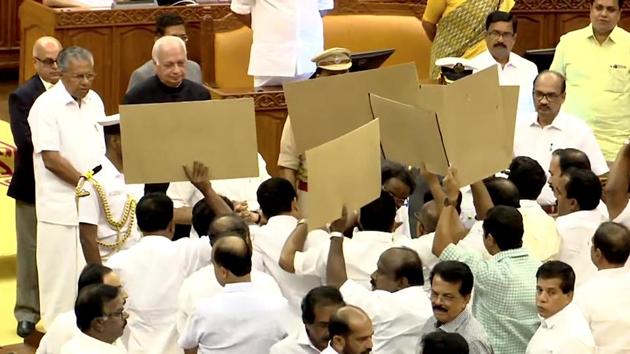‘Governor can’t read his personal views in customary speech’: Experts weigh in
A governor’s discretionary powers are not codified in the Constitution but scattered in its various parts, experts - who have weighed on the matter - point out.
Do governors have the right to preface parts of the customary speech they read out on behalf of a state government with a disclosure that they do not really think it belongs in the speech?

Convention and practice say they do not, but that did not stop Kerala governor Arif Mohammad Khan from doing just that.
Khan has been at loggerheads with the state government over its anti-Citizenship (Amendment) Act resolution passed by the assembly and its moving the Supreme Court to strike down the law. He said in the assembly on Wednesday that though he has “reservations and disagreement” over the subject, he would read paragraph 18 of the policy address, to “honour” chief minister Pinarayi Vijayan’s wish.
Supreme Court advocate Gyanant Singh said that, as the head of a state, the governor has to read the “visionary document of the state administration, what it proposes to do in exercise of its power as an elected government” and in doing so, cannot substitute the government’s vision with his personal disposition.
“In such a matter, a governor cannot impose his discretionary views. Also, the powers of a governor are clearly laid out in the Constitution, and to read out his mind on a particular issue while speaking on the first day of the assembly session is not subject to the mandate laid out,” Singh said.
A governor’s discretionary powers are not codified in the Constitution but scattered in its various parts.
Governors, as heads of states, derive their powers from Article 163 of the Constitution. There is no bar on them giving suggestions.But by the discretionary powers entrusted to governors under the Constitution, they are bound by the aid and advice of council of ministers in the exercise of all functions, as per Article 163. This constitutional position was first expounded by the Supreme Court in the Ram Jawaya Kapoor case in 1955.
The budget session in Kerala witnessed dramatic scenes on Wednesday as MLAs stood in the House with anti-CAA posters and raised “governor, go back” slogans. Following this, the watch and ward personnel cleared the way for Khan, who, with the CM and Speaker by his side, and with folded hands, said “thank you” to the protesting legislators. He then read out paragraph 18 of the speech, but only after speaking his mind.
“I am going to read this para because the Chief Minister wants me to read this. Although I hold the view this doesn’t come under policy or programme. Chief minister has said this is the view of government, and to honour his wish I’m going to read this para,” he said.
Former Lok Sabha secretary general PDT Achary said as per convention and Constitution, a governor is head of a state and is bound to read out the speech approved by the government.
“He is not responsible for the contents of the speech and this is a practise prevailing in various democracies where parliamentary system is present,” Achary said. An elected government is responsible to the legislature, which in turn is responsible up the electorate, he added.
Even if the governor adds or subtracts to the speech, it would not be taken on record, explained Achary.
Khan and the Kerala government have been on a collision course, with the former criticising the anti-CAA resolution the assembly passed on December 31 against the new citizenship law. Following Kerala’s move, three other state assemblies -- Punjab, Rajasthan and West Bengal -- have also passed resolutions against CAA. The amended law fast-tracks citizenship for minorities from Muslim-majority Afghanistan, Pakistan and Bangladesh who came to India before 2015. While the Union government has described it as an empowering tool for persecuted minorities, it has been criticised for linking religion with citizenship and for being discriminatory towards Muslims.






